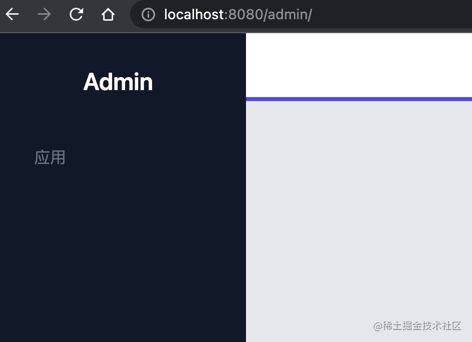Gingo
Introduce
Gingo是基于 gin 框架为核心的脚手架,能够快速创建Restful风格的API接口,并且能提供简单的后台管理功能,使用本项目可以快速完成业务逻辑开发。
Github: https://github.com/songcser/gingo
Feature
- gin框架,简单,高效,轻量
- gorm数据库ORM框架,封装mapper,使用简单
- viper配置管理
- zap日志框架,输出日志更灵活
- api接口封装,快速实现CURD操作,提供Restful风格接口
- admin后台管理,实现了简单的后台管理,方便进行数据管理
- 使用范型,go版本不能低于1.18
Catalogue
.
|——.gitignore
|——go.mod
|——go.sum
|——cmd
└──migrate
└──main.go // 注册数据库表
└──main.go // 项目入口main
|——README.md
|——config // 配置文件目录
| └──autoload // 配置文件的结构体定义包
| └──admin.go // admin配置
| └──db.go
| └──jwt.go // jwt配置
| └──mysql.go // mysql配置
| └──zap.go // zap日志配置
| └──config.yaml // .yaml配置示例文件
| └──config.go // 配置初始化文件
|——initialize // 数据初始化目录
| └──admin.go // admin初始化
| └──constants.go // 常量数据
| └──gorm.go // 数据库初始化
| └──mysql.go // mysql初始化
| └──router.go // gin初始化
| └──swagger.go
| └──viper.go // viper配置初始化
| └──zap.go // zap日志初始化
|——internal // 该服务所有不对外暴露的代码,通常的业务逻辑都在这下面,使用internal避免错误引用
|──middleware // 中间件目录
| └──logger.go // 日志中间件,打印请求数据
| └──recovery.go // 自定义recovery, 输出错误格式化
|──pkg // 内部服务包
| └──admin // admin实现逻辑
| └──admin.go
| └──init.go
| └──model.go
| └──service.go
| └──api // API接口封装
| └──api.go
| └──auth // 登陆授权接口封装
| └──model.go
| └──user.go
| └──model // 底层模型封装
| └──mapper.go
| └──model.go
| └──page.go
| └──wrapper.go
| └──response // 响应数据模型封装
| └──page.go
| └──response.go
| └──router // 路由模块封装
| └──router.go
| └──service // 服务模块封装
| └──service.go
|──templates // admin模版页面
| └──add.html // 新建页面
| └──edit.html // 编辑页面
| └──embed.go
| └──header.html // 头部页面
| └──home.html // 首页
| └──index.html // 主页面
| └──login.html // 登陆页面
| └──register.html // 注册页面页面
| └──sidebar.html // 左边栏页面
|──utils // 一些工具方法
| └──cache.go // 缓存
| └──error.go // error检查
| └──hash.go // hash加密解密
| └──http.go // http客户端请求
| └──json.go //
| └──jwt.go // JWT
| └──path.go // 文件路径
| └──time.go // time相关方法
| └──translator.go // 中英文翻译
Usage
internal目录是不对外暴露的代码,在做go get时,此目录不会被下载,所以通常业务逻辑放在这个下面。
我们将在这个目录下面加一些业务代码,说明脚手架的使用。
在internal目录下新增 app 包目录
Model
// Package app model.go
package app
import "github.com/songcser/gingo/pkg/model"
type App struct {
model.BaseModel
Name string `json:"name" gorm:"column:name;type:varchar(255);not null"`
Description string `json:"description" gorm:"column:description;type:varchar(4096);not null"`
Level string `json:"level" gorm:"column:level;type:varchar(8);not null"`
Type string `json:"type" gorm:"column:type;type:varchar(16);not null"`
}App模型有4个自定义字段,gorm标签会对应到数据库的字段。
package model
type Model interface {
Get() int64
}
type BaseModel struct {
ID int64 `json:"id" gorm:"primarykey" admin:"disable"` // 主键ID
CreatedAt utils.JsonTime `json:"createdAt" gorm:"index;comment:创建时间" admin:"disable"` // 创建时间
UpdatedAt utils.JsonTime `json:"updatedAt" gorm:"index;comment:更新时间" admin:"disable"` // 更新时间
}
func (m BaseModel) Get() int64 {
return m.ID
}BaseModel 是基础模型,有一些公共字段, 并且实现了 Model interface, 所有引用 BaseModel 的模型都实现了 Model interface。
创建数据库表
# Package initialize gorm.go
package initialize
// RegisterTables 注册数据库表专用
func RegisterTables(db *gorm.DB) {
err := db.Set("gorm:table_options", "CHARSET=utf8mb4").AutoMigrate(
// 系统模块表
auth.BaseUser{},
app.App{}, // app表注册
)
if err != nil {
os.Exit(0)
}
}
执行 migrate 的 main 方法会在数据库创建对应的表。
Api
// Package app api.go
package app
import (
"github.com/songcser/gingo/pkg/api"
"github.com/songcser/gingo/pkg/service"
)
type Api struct {
api.Api
}
func NewApi() Api {
var app App
baseApi := api.NewApi[App](service.NewBaseService(app))
return Api{baseApi}
}api.Api接口
// Package api api.go
package api
import "github.com/gin-gonic/gin"
type Api interface {
Query(c *gin.Context)
Get(c *gin.Context)
Create(c *gin.Context)
Update(c *gin.Context)
Delete(c *gin.Context)
}
api.Api接口定义了CURD方法,并且方法都是gin.HandlerFunc类型,可以直接绑定到gin Router上。
BaseApi实现了CURD的基本方法,app.Api类型组合了BaseApi的方法。
Router
// Package app router.go
package app
import (
"github.com/gin-gonic/gin"
"github.com/songcser/gingo/pkg/router"
)
func InitRouter(g *gin.RouterGroup) {
r := router.NewRouter(g.Group("app"))
a := NewApi()
r.BindApi("", a)
}router 是对gin.RouterGroup做了简单封装,方便和Api类型做绑定。
BindApi方法将Api的 CURD 方法和router进行了绑定。
启动服务之后,执行脚本或者使用 postman 请求服务
创建数据
curl --location 'http://localhost:8080/api/v1/app' \
--header 'Content-Type: application/json' \
--data '{
"name": "测试应用",
"description": "测试应用服务",
"level": "S3",
"type": "container"
}'返回内容
{
"code": 0,
"data": true,
"message": "success"
}成功创建数据
查询数据
curl --location 'http://localhost:8080/api/v1/app'返回内容
{
"code": 0,
"data": {
"total": 1,
"size": 10,
"current": 1,
"results": [
{
"id": 1,
"createdAt": "2023-04-13 16:35:59",
"updatedAt": "2023-04-13 16:35:59",
"name": "测试应用",
"description": "测试应用服务",
"level": "S3",
"type": "container"
}
]
},
"message": "success"
}查询单个数据
curl --location 'http://localhost:8080/api/v1/app/1'返回内容
{
"code": 0,
"data": {
"id": 1,
"createdAt": "2023-04-13 16:56:09",
"updatedAt": "2023-04-13 16:58:29",
"name": "测试应用",
"description": "测试应用服务",
"level": "S3",
"type": "container"
},
"message": "success"
}更新数据
curl --location --request PUT 'http://localhost:8080/api/v1/app/1' \
--header 'Content-Type: application/json' \
--data '{
"name": "测试应用",
"description": "测试应用服务",
"level": "S1",
"type": "container"
}'返回内容
{
"code": 0,
"data": true,
"message": "success"
}删除数据
curl --location --request DELETE 'http://localhost:8080/api/v1/app/1'返回内容
{
"code": 0,
"data": true,
"message": "success"
}自定义方法
api添加新的方法
// Package app api.go
package app
func (a Api) Hello(c *gin.Context) {
response.OkWithData("Hello World", c)
}router进行绑定
r.BindGet("hello", a.Hello)接口请求
curl --location 'http://localhost:8080/api/v1/app/hello'返回内容
{
"code": 0,
"data": "Hello World",
"message": "success"
}Service
在 NewApi 时使用的是BaseService,可以实现自定义的Service,重写一些方法。
package app
import (
"github.com/gin-gonic/gin"
"github.com/songcser/gingo/pkg/model"
"github.com/songcser/gingo/pkg/service"
"github.com/songcser/gingo/utils"
)
type Service struct {
service.Service[App]
}
func NewService(a App) Service {
return Service{service.NewBaseService[App](a)}
}
func (s Service) MakeMapper(c *gin.Context) model.Mapper[App] {
var r Request
err := c.ShouldBindQuery(&r)
utils.CheckError(err)
w := model.NewWrapper()
w.Like("name", r.Name)
w.Eq("level", r.Level)
m := model.NewMapper[App](App{}, w)
return m
}
func (s Service) MakeResponse(val model.Model) any {
a := val.(App)
res := Response{
Name: a.Name,
Description: fmt.Sprintf("名称:%s, 等级: %s, 类型: %s", a.Name, a.Level, a.Type),
Level: a.Level,
Type: a.Type,
}
return res
}
- MakeMapper方法重写新的Mapper,可以自定义一些查询条件。
- MakeResponse方法可以重写返回的内容
在Api中替换新的Service
// Package app api.go
func NewApi() Api {
var app App
s := NewService(app) //使用新的Service
baseApi := api.NewApi[App](s)
return Api{Api: baseApi}
}查询数据
curl --location 'http://localhost:8080/api/v1/app?name=测试&level=S3'返回内容
{
"code": 0,
"data": {
"total": 1,
"size": 10,
"current": 1,
"results": [
{
"name": "测试应用",
"description": "名称:测试应用, 等级: S3, 类型: container",
"level": "S3",
"type": "container"
}
]
},
"message": "success"
}如果要在Service增加新的方法,需要在Api模型中重写Service
// Package app service.go
func (s Service) Hello() string {
return "Hello World"
}Api实现
// Package app api.go
package app
type Api struct {
api.Api
Service Service // 重写Service
}
func NewApi() Api {
var app App
s := NewService(app)
baseApi := api.NewApi[App](s)
return Api{Api: baseApi, Service: s}
}
func (a Api) Hello(c *gin.Context) {
str := a.Service.Hello() // 调用Service方法
response.OkWithData(str, c)
}
Admin
Admin 提供了简单的后台管理服务,可以很方便的对数据进行管理。
首先需要在配置文件中开启 Admin
admin:
enable: true
auth: trueauth 会开启认证授权,需要登陆
接入 Admin 也比较简单
// Package app admin.go
package app
import (
"github.com/songcser/gingo/pkg/admin"
)
func Admin() {
var a App
admin.New(a, "app", "应用")
}在 initialize 中引入 admin
// Package initialize admin.go
package initialize
func Admin(r *gin.Engine) {
if !config.GVA_CONFIG.Admin.Enable {
return
}
admin.Init(r, nil)
app.Admin()
}在管理页面可以进行简单的查询,创建,修改,删除操作。
Model 字段中可以配置 admin 标签,管理页面可以根据类型展示。
// Package app model.go
package app
import "github.com/songcser/gingo/pkg/model"
type App struct {
model.BaseModel
Name string `json:"name" form:"name" gorm:"column:name;type:varchar(255);not null" admin:"type:input;name:name;label:应用名"`
Description string `json:"description" form:"description" gorm:"column:description;type:varchar(4096);not null" admin:"type:textarea;name:description;label:描述"`
Level string `json:"level" form:"level" gorm:"column:level;type:varchar(8);not null" admin:"type:radio;enum:S1,S2,S3,S4,S5;label:级别"`
Type string `json:"type" form:"type" gorm:"column:type;type:varchar(16);not null" admin:"type:select;enum:container=容器应用,web=前端应用,mini=小程序应用;label:应用类型"`
}- type: 字段类型,取值 input, textarea, select, radio。
- name: 字段名称
- label: 字段展示名称
- enum: 枚举数据,在select,radio类型时展示更加友好
需要添加 form 标签,由于是使用 html 的 form 提交数据。
访问链接
http://localhost:8080/admin/
首页
点击应用,查看应用列表
点击 创建应用 按钮


